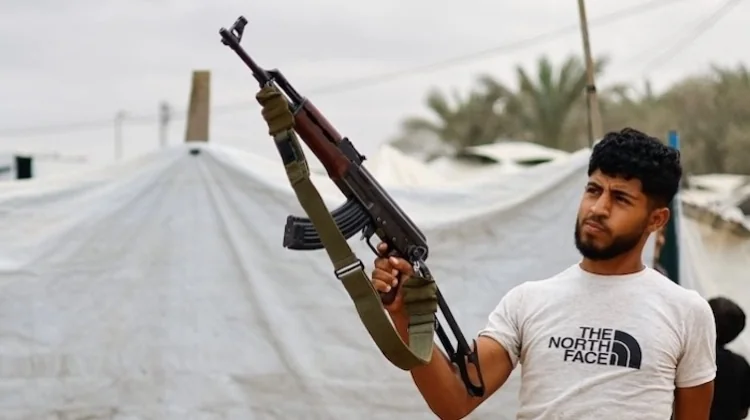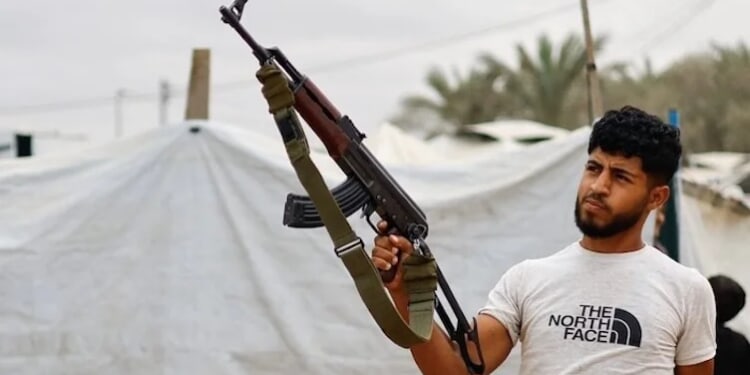
[Order Michael Finch’s new book, A Time to Stand: HERE. Prof. Jason Hill calls it “an aesthetic and political tour de force.”]
The IDF has badly battered Hamas, so much so that the clans of the large families, who have their own armed militias, have started to challenge its authority, pitting their own forces against what remains of the once-feared Hamas brigades. From Gaza City in the north to Rafah in the south, the clans are out in force, attacking Hamas in order to take control themselves of their own neighborhoods. These families now, at a time of the breakdown in Hamas’ numbers and authority, are supplanting the terror group across the Strip. More on the rise of the clans in Gaza can be found here: “Chaos reported as Palestinian factions revolt against Hamas in post-ceasefire Gaza,” by Ellie Leon, Jerusalem Post, October 11, 2025:
Following a wave of armed clashes between Hamas terrorists and local Palestinian groups, Palestinian sources are reporting a widespread breakdown in security across the Gaza Strip.
In Beit Lahia, an exchange of gunfire erupted between gunmen affiliated with Ashraf al-Mansi and Hamas forces. At the same time, another confrontation was reported in the Sabra neighborhood of Gaza City between the Dajmash clan and Hamas, during which Muhammad Imad Aql, the son of a senior Hamas military commander who was previously assassinated, was killed.
Hamas forces surrounded the al-Dhamsha family neighborhood in the al-Sabra area of Gaza City on Friday night. Schools and residential towers were evacuated, while snipers and a large number of masked, armed men were deployed throughout the area.
This appears to be a different family, not a typographical error: The Dajmash clan is different from the Dhamsha clan. Hamas came out in force, surrounding the Dhamsha family’s neighborhood, evacuated civilians from schools and residences, and deployed its snipers and masked men with rifles throughout in the Sabra neighborhood of Gaza. It’s not known if the standoff continues, or if there was a clear victory for either side — Hamas or the Damsha clan.
Hamas views the rebellious clans as a direct threat to its control over Gaza City, according to Palestinian sources. During the war, Hamas executed the mukhtar (chief) of the Dajmash clan — one of the armed families in northern Gaza — fearing that Israel might try to use the clan against it. As part of its efforts to suppress the uprising, Hamas sent senior fighters to attempt an assassination of Yasser Abu Shabab, leader of the Rafah militia. The assassination attempt failed.
In executing the chief of the Dajmash clan, Hamas did not scare it into submission. Quite the contrary: it caused more bad blood, and the Dajmash are now implacable enemies of Hamas. And Hamas’ fear that Israel could ally itself with the clan has come to pass: the IDF now has supplied the Dajmash militia with more arms to fight their common enemy, Hamas.
Meanwhile, Hussam al-Astal, commander of an armed group opposed to Hamas in Khan Yunis, published a defiant post on his Facebook page, harshly attacking the organization.
“To all the Hamas rats,” he wrote, “your tunnels are destroyed, your rights no longer exist. Repent before it’s too late — there is no Hamas from today onward.”…
A year ago, such a post directed at Hamas would have been unthinkable. Today, Hamas has been ripped to shreds everywhere — in Rafah, in Khan Yunis, and even in Gaza City. Hussam al-Astal’s armed group is apparently not clan-based, but consists of people who have simply had enough of Hamas, for getting them in to this destructive war, for stealing so much of the humanitarian aid for its own members, and then selling it, at exorbitant prices, to the very people in Gaza who were supposed to receive the aid for free. And Hamas has been murdering anyone in Gaza who openly opposes them.
No doubt the IDF has supplied weapons to some of the clans fighting Hamas. It has also helped, as with the al-Majaida clan in Khan Yunis, to attack Hamas forces threatening those clans. Thanks to an Israeli airstrike, Hamas fighters in Khan Yunis were forced to call off their offense against the al-Majaida clan just when they seemed to be gaining the upper hand.
Following these events, Hamas officials issued calls for revenge against the armed groups that, according to them, cooperated with Israel. Channels affiliated with the organization reported their intention to “settle accounts” with the groups’ leaders — including Abu Shabab, al-Astal, Rami Khalas, and al-Mansi.
This threat by Hamas to “settle accounts” with the leaders of the family clans and other anti-Hamas groups has not scared them. Abu Shabab, al-Astal, Rami Khalas, and al-Mansi are all still fighting, and more than holding their own against the Hamas fighters sent to crush them.
The anti-Hamas family clans can continue to count on Israel for weapons and even for protection during attacks by Hamas. Israel, in this first phase of the Trump Plan, will remain in eastern Rafah, parts of Beit Lahiya and Beit Hanoun, and eastern Khan Yunis, all areas where the clans have challenged Hamas, and from which the IDF will not withdraw until a much later phase of the Trump Plan, by which time Hamas’ adamant refusal to give up all of its weapons should cause the Plan to fail.
Al-Astal declared that his men continue to operate: “Let the Hamas dogs not rejoice — we are here, and they are the ones who will fall.”
Could such a remark have been made a year ago? Or even six months ago? So precipitous has been the fall of Hamas that enemies such as al-Astal dare to taunt Hamas: “Hamas dogs…we are here and they are the ones who will fall.”
Hamas may give up its heavy weapons if Qatar, under pressure from Trump, threatens to cut off all financial aid to Hamas and to expel its leaders from Doha if it does not relinquish those weapons. Hamas is likely ultimately to agree to give up its heavy weapons, but on no account will it give up its rifles and submachine guns, that it needs to protect itself against the rage of ordinary Gazans who have suffered so much because of Hamas, including the members of the powerful family clans. And in case of that refusal by Hamas, Qatar — being closely monitored by the American government — will have to end its delivery of weapons and money to Hamas in Gaza. That will weaken Hamas still further, and embolden the family clans to further acts of defiance, including attacks on Hamas members who dare try to reestablish their authority in areas of Gaza where the clans now hold sway.

















